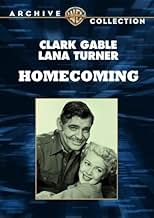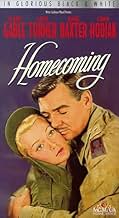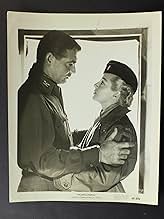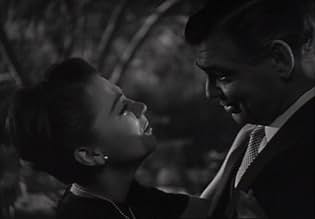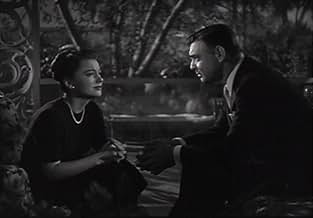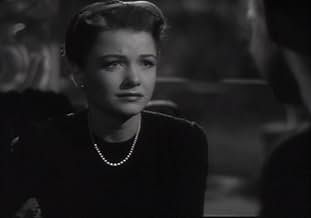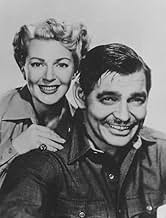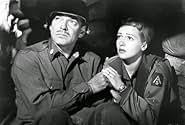AVALIAÇÃO DA IMDb
6,8/10
1,2 mil
SUA AVALIAÇÃO
Adicionar um enredo no seu idiomaAt the end of WW2, aboard a repatriation ship, an Army doctor reminisces about his war years while being interviewed by a reporter.At the end of WW2, aboard a repatriation ship, an Army doctor reminisces about his war years while being interviewed by a reporter.At the end of WW2, aboard a repatriation ship, an Army doctor reminisces about his war years while being interviewed by a reporter.
- Direção
- Roteiristas
- Artistas
- Prêmios
- 4 vitórias no total
Jessica Grayson
- Sarah, Johnson's Maid
- (as Jessie Grayson)
John Albright
- Corpsman
- (não creditado)
Frank Arnold
- Maitre d'Hotel
- (não creditado)
Peggy Badley
- Nurse Betty Simpson
- (não creditado)
Art Baker
- Williams, Reporter on Transport Ship
- (não creditado)
Gregg Barton
- Captain
- (não creditado)
Nanette Bordeaux
- Nurse
- (não creditado)
- Direção
- Roteiristas
- Elenco e equipe completos
- Produção, bilheteria e muito mais no IMDbPro
Avaliações em destaque
This is a far from perfect film featuring Gable and Turner, but upon seeing it for the second time, it sure seemed a lot better than I remembered it. In particular, I appreciated that the film took a pretty big risk dealing with wartime romance between a married doctor and a nurse when they are stationed overseas. This sort of situation MUST have happened quite a bit with all those nurses and WACS/WAVS, etc. serving in action, though it is hardly ever mentioned in any film up until that time. Plus, it offered a very unusual situation where a man is in love with a woman he is not married to and yet he still loves his wife at home. Pretty adult fare for 1948, I must say! The film begins with Gable a rich and successful doctor in the States. He is very isolated from the real world and his main focus in on the country club and his pampered wife--unconcerned about much else. When the war comes, he does serve but seems to be pretty selfish. His head nurse in the field hospital is a much more giving and selfless individual and they are destined to hate each other because they are so different AND because this IS Lana Turner and Clark Gable (this plot device is necessary before they actually fall in love--a bit of a cliché, I know).
Gable and Turner are both excellent as the leads and their scenes together are excellent as well. I especially appreciated Lana's emotional range--it was better and more vulnerable here than I am used to seeing. The direction was pretty good and all the MGM production values were going full speed ahead! I especially appreciated the snow scene--you KNOW it was done in a sound stage and yet it STILL looked exceptional (though their breath didn't show--considering it was probably close to 70 degrees).
Overall, this is a must-see for Gable fans and a pretty good flick for anyone but people who MUST have a lot of action in their films. Despite being WWII, the film is pretty talking and there is quite a bit of romance--something action junkies will probably have a hard time accepting.
Gable and Turner are both excellent as the leads and their scenes together are excellent as well. I especially appreciated Lana's emotional range--it was better and more vulnerable here than I am used to seeing. The direction was pretty good and all the MGM production values were going full speed ahead! I especially appreciated the snow scene--you KNOW it was done in a sound stage and yet it STILL looked exceptional (though their breath didn't show--considering it was probably close to 70 degrees).
Overall, this is a must-see for Gable fans and a pretty good flick for anyone but people who MUST have a lot of action in their films. Despite being WWII, the film is pretty talking and there is quite a bit of romance--something action junkies will probably have a hard time accepting.
Ulysses ,what a name for a major whose odyssey took place in WW2,who learned after his "voyage" that success is no success at all,that selfishness leads to nowhere and that a doctor's work is to help his fellow men;we are not far from Stahl's "magnificent obsession" in which a reckless playboy was told that a man (Jesus ) had given his life so man was saved .
It's strange that the world Ulysse lives in is full of altruistic persons ,from "Snapshot" the nurse who never has a rest till all the wounded soldiers are operated to the Chester doctor (Hodiak) whose war has begun long before WW2,and from "Monk" the unfortunate soldier to the good doctor Sunday (again,what a name!).The US army looks more like Salvation Army! The title is partly a misnomer because it's essentially a long flashback (actually several flashbacks) dealing with the hard life of a military medical team in the war.Thus Gable is torn between his faithful wife (Anne Baxter) and his courageous nurse (their relationship is much too predictable).Best scene is perhaps the "Roman " bath :we feel that Gable is very human when she takes her bath and he 's got to force himself to stay calm and not to have a little look !
It's strange that the world Ulysse lives in is full of altruistic persons ,from "Snapshot" the nurse who never has a rest till all the wounded soldiers are operated to the Chester doctor (Hodiak) whose war has begun long before WW2,and from "Monk" the unfortunate soldier to the good doctor Sunday (again,what a name!).The US army looks more like Salvation Army! The title is partly a misnomer because it's essentially a long flashback (actually several flashbacks) dealing with the hard life of a military medical team in the war.Thus Gable is torn between his faithful wife (Anne Baxter) and his courageous nurse (their relationship is much too predictable).Best scene is perhaps the "Roman " bath :we feel that Gable is very human when she takes her bath and he 's got to force himself to stay calm and not to have a little look !
I've never been one to compliment Clark Gable's acting talents. Yes, he had a great screen presence and represented the everyman in the early '30s when no other good-looking actor fit the bill, but I usually thought all he did was shout and talk quickly. In Homecoming, he surprised me. Full of subtleties and tender expressions, he stars as a man coming home from the war but holds memories he'll never be able to bury.
Told in flashback format, a reporter, talks to different soldiers returning on the ship. When he approaches Clark Gable, he's initially resistant. But thanks to the camera, we get to learn what Clark doesn't tell the reporter. Clark was a doctor, stationed overseas with his pal and fellow doctor John Hodiak. His nurse was the capable Lana Turner, in a rare break from her sexpot roles. They worked fantastically well together and bonded over seeing the horrors of war. Homecoming is a rare honest movie that shows how overworked and underappreciated the doctors, nurses, and medics were. The movie shows them being just as bombarded as the fighting men, with influx after influx of severely injured soldiers coming into the medical tent so quickly and urgently that they can't catch their breaths. It's far different to be a doctor at home than a doctor at war, and only those who have experienced it can truly understand. If you were moved by Lara and Dr. Zhivago's relationship, you'll love this movie.
If 1948 hadn't had such stiff competition, as Hatter's Castle, All My Sons, and Enchantment, I'm sure this movie would have racked up some nominations at the Hot Toasty Rag Awards. As it was, this move wasn't honored, but I do highly recommend it. It's a change of pace for both leads, and in a post-war world, it was the perfect type of war movie to be released in 1948. Many veterans had a tough transition from the battlefield to civilian life, and this movie shows one man's struggle. In the supporting cast, you'll see Anne Baxter, Marshall Thompson, Gladys Cooper, Ray Collins, Queenie Leonard, Cameron Mitchell, and cameos from Jeff Corey and a pre-famous Arthur O'Connell.
Told in flashback format, a reporter, talks to different soldiers returning on the ship. When he approaches Clark Gable, he's initially resistant. But thanks to the camera, we get to learn what Clark doesn't tell the reporter. Clark was a doctor, stationed overseas with his pal and fellow doctor John Hodiak. His nurse was the capable Lana Turner, in a rare break from her sexpot roles. They worked fantastically well together and bonded over seeing the horrors of war. Homecoming is a rare honest movie that shows how overworked and underappreciated the doctors, nurses, and medics were. The movie shows them being just as bombarded as the fighting men, with influx after influx of severely injured soldiers coming into the medical tent so quickly and urgently that they can't catch their breaths. It's far different to be a doctor at home than a doctor at war, and only those who have experienced it can truly understand. If you were moved by Lara and Dr. Zhivago's relationship, you'll love this movie.
If 1948 hadn't had such stiff competition, as Hatter's Castle, All My Sons, and Enchantment, I'm sure this movie would have racked up some nominations at the Hot Toasty Rag Awards. As it was, this move wasn't honored, but I do highly recommend it. It's a change of pace for both leads, and in a post-war world, it was the perfect type of war movie to be released in 1948. Many veterans had a tough transition from the battlefield to civilian life, and this movie shows one man's struggle. In the supporting cast, you'll see Anne Baxter, Marshall Thompson, Gladys Cooper, Ray Collins, Queenie Leonard, Cameron Mitchell, and cameos from Jeff Corey and a pre-famous Arthur O'Connell.
What a gem this story is! Here you will find no platitudes; no heroes 10 feet tall; no heels - most of all no heels. This is about the most caring, life-affirming story you are ever going to find, and it is done without any syrup, nor any gratuitous and tiresome acting-out of missteps.
There is a a single scene near the end which implies that a single misstep MAY have been committed, but sorry to tell you, you are going to have to work out for yourself what did or didn't happen, because it's not spelled out. It was brave rather than a cop-out to present a pivotal scene that way.
The film is technically excellent. The scene composition is superb. You have never seen a WW2 field hospital so meticulously and realistically re-created. There is a scene viewed through the door of a tent where someone walks away that is so amazingly technically well done (as well as evocative) as to be amazing. I can't tell you that the snow falling in that scene was real, but it LOOKED absolutely real. The fadeout as the figure walked gradually into the falling snow was perfect. It's a little thing that a film nut notices, because it's hard to do.
The messages are about finding one's humanity, daring to need, and daring to reach out to someone to need you back. By the end, you may find yourself touched so deeply as to be shaking.
There is a a single scene near the end which implies that a single misstep MAY have been committed, but sorry to tell you, you are going to have to work out for yourself what did or didn't happen, because it's not spelled out. It was brave rather than a cop-out to present a pivotal scene that way.
The film is technically excellent. The scene composition is superb. You have never seen a WW2 field hospital so meticulously and realistically re-created. There is a scene viewed through the door of a tent where someone walks away that is so amazingly technically well done (as well as evocative) as to be amazing. I can't tell you that the snow falling in that scene was real, but it LOOKED absolutely real. The fadeout as the figure walked gradually into the falling snow was perfect. It's a little thing that a film nut notices, because it's hard to do.
The messages are about finding one's humanity, daring to need, and daring to reach out to someone to need you back. By the end, you may find yourself touched so deeply as to be shaking.
As a rule I'm not much into romantic films, but there are exceptions and Homecoming is one of them.
Clark Gable and Lana Turner did four films together and this is the third one. It's Turner's show here. It's a great tribute to her charisma and star quality that she looks incredibly sexy in those army fatigues she has to wear as per the plot. Lana Turner in her
younger days had a quality of winsomeness that was never showcased than when she plays Jane "Snapshot" McCall, idealistic army nurse.
In this cynical age we would look with incredulity that a widow with a young son would follow her late husband off to war because his ideals became her ideals. Yet Turner makes you believe that in this film.
The plot is simply Clark Gable, very successful doctor in a small mid-west city, goes to World War II basically because its expected of him. He's a self centered guy, nice home, loving wife played very well by Anne Baxter, all the material things you could want and not a clue about why we are in World War II. He has a fellow physician friend, John Hodiak who does a lot of pro bono public service work who tries to act as a conscience, but fails. I guess Turner had something to offer Hodiak didn't.
At first Dr. Ulysses Johnson (Gable) and Nurse McCall don't hit it off after she's assigned to him as a nurse. But her beauty and idealism get to him he falls for her big time.
Because its 1948 Hollywood and Anne Baxter is by no means a bad person there was no way Turner was going to wind up with Gable in the end. She has to die, but Turner is given a death scene that is one of the most moving in the history of film. You have to be made of stone not to be touched by her and Gable at her bedside.
John Hodiak, a very talented and almost forgotten figure today is also terrific as Gable's friend Dr. Robert Sunday. Gable will be working with Hodiak at the clinic Hodiak has in a poor neighborhood and he will be doing it because of the social conscience Turner has instilled in him.
There are no bad people in this film except the Nazis shooting at Gable Turner and the rest of Eisenhower's army.
I believe this is Lana Turner's best film and fans of her's should not miss this one.
Clark Gable and Lana Turner did four films together and this is the third one. It's Turner's show here. It's a great tribute to her charisma and star quality that she looks incredibly sexy in those army fatigues she has to wear as per the plot. Lana Turner in her
younger days had a quality of winsomeness that was never showcased than when she plays Jane "Snapshot" McCall, idealistic army nurse.
In this cynical age we would look with incredulity that a widow with a young son would follow her late husband off to war because his ideals became her ideals. Yet Turner makes you believe that in this film.
The plot is simply Clark Gable, very successful doctor in a small mid-west city, goes to World War II basically because its expected of him. He's a self centered guy, nice home, loving wife played very well by Anne Baxter, all the material things you could want and not a clue about why we are in World War II. He has a fellow physician friend, John Hodiak who does a lot of pro bono public service work who tries to act as a conscience, but fails. I guess Turner had something to offer Hodiak didn't.
At first Dr. Ulysses Johnson (Gable) and Nurse McCall don't hit it off after she's assigned to him as a nurse. But her beauty and idealism get to him he falls for her big time.
Because its 1948 Hollywood and Anne Baxter is by no means a bad person there was no way Turner was going to wind up with Gable in the end. She has to die, but Turner is given a death scene that is one of the most moving in the history of film. You have to be made of stone not to be touched by her and Gable at her bedside.
John Hodiak, a very talented and almost forgotten figure today is also terrific as Gable's friend Dr. Robert Sunday. Gable will be working with Hodiak at the clinic Hodiak has in a poor neighborhood and he will be doing it because of the social conscience Turner has instilled in him.
There are no bad people in this film except the Nazis shooting at Gable Turner and the rest of Eisenhower's army.
I believe this is Lana Turner's best film and fans of her's should not miss this one.
Você sabia?
- CuriosidadesAccording to the AFI catalog entry for this film, for the battle scenes in Italy, MGM constructed five 35-foot towers, a full-sized evacuation hospital, and more than 100 Army tents at the Lasky-Mesa movie ranch 35 miles outside of Hollywood. The set took three weeks to build and the scenes used hundreds of extras, five cameras, and six assistant directors. This was all for a re-creation of the historic capture of the Anzio beachhead in Italy by U.S. and British forces on January 22, 1944.
- Erros de gravaçãoAt the end, Penny Johnson says she followed her husband's movements on a map. During World War II, people in the military had it drilled into them that they could not say anything about where they were in letters sent back home, and to make sure they kept that rule, the mail from soldiers was censored. This has been mentioned in numerous histories of World War II. With Clark Gable being an officer, it's even less likely any information about his movements around Europe would have been available to his wife.
- ConexõesEdited from A Ponte de Waterloo (1940)
Principais escolhas
Faça login para avaliar e ver a lista de recomendações personalizadas
Detalhes
- Data de lançamento
- País de origem
- Idioma
- Também conhecido como
- Renunciación
- Locações de filme
- Empresa de produção
- Consulte mais créditos da empresa na IMDbPro
Bilheteria
- Orçamento
- US$ 2.654.000 (estimativa)
- Tempo de duração1 hora 53 minutos
- Cor
- Proporção
- 1.37 : 1
Contribua para esta página
Sugerir uma alteração ou adicionar conteúdo ausente

Principal brecha
By what name was O Amor que Me Deste (1948) officially released in India in English?
Responda

